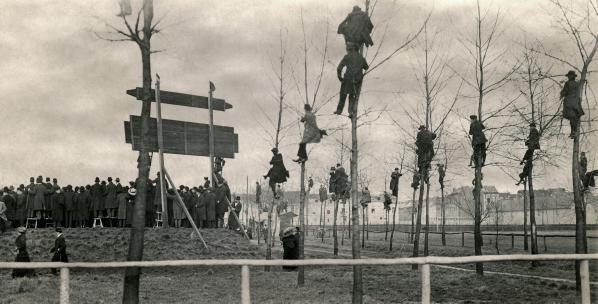Familysearch allows you to collaborate on an integrated family tree that joins everyone, like a Wikipedia for deceased persons. The idea is that genealogists can reach consensus about people: about the dates and places of events, but more importantly about relationships between people. Users can cite or upload sources to support their conclusions.
At first, I was enthusiastic. It seemed wonderful to collaborate on interesting puzzles with several genealogists, based on sources we would all contribute. I have helped write dozens of Wikipedia articles and enjoyed seeing how a group knows more than an individual. I would love to see the same synergy happening in genealogy.

People climbing trees, 1913. Image credits: Spaarnestad Photo
After my first experience, I started to have doubts. How feasible is this? For simple cases, it is easy enough. When the evidence is clear and convincing, “edit wars,” where multiple people argue about the correct interpretation, are unlikely to occur. But I know plenty of situations where two well-willing, knowledgeable genealogists come to different conclusions based on the same evidence.
Pretty soon I realized that my main doubts were about a more fundamental problem: do I want this to become a success? If the experiment succeeds, future genealogists will be able to find their ancestors with a push of a button. How much fun will genealogy be? It’s like watching soccer: you watch because you enjoy the match, not to know the result. But the match is a whole lot less fun to watch if you know the result beforehand.
Another problem is skill building. If a fledgling genealogist finds that all the easy work has been done, he can’t jump in with the hard work because he lacks the skills. Re-inventing the wheel and finding the ‘easy’ nineteenth and twentieth century ancestors yourself teaches you how to do research.
I also think it will be too easy to take information for granted. Everybody who has even printed a fan chart knows the magical pull of the empty boxes. Those are the boxes that draw our attention, those holes need filling. The boxes that are filled out may be based on conjecture or unreliable evidence is not obvious. A fan chart prints them all in the same black ink and does not invite you to investigate further. Likewise, the integrated family tree will not invite people to critically re-assess information that has already been entered. The joint focus will shift towards the brick walls.
After consideration, I have decided to keep working on my personal trees. I share them online, so other people can find me and collaborate when we work on the same families. That gives me all of the benefits of collaboration, but also keeps our hobby fun for the generations who come after us.


Unfortunately I am seeing more and more occurrence in FamilySearch’s Family Tree, of folks’ entering incorrect data for which they give no foundation other than unidentified “Family records,” “GEDCOM” and nonfunctional links to old internet-hosted trees.
In many instances I happen to know where the genealojunk comes from, having myself explored the paths of purported reasoning back to such items as unsupported assertions in published works.
The architects of FS-FT have an extremely optimistic view that it will all work out to predominance of accuracy in the future. Unfortunately, it appears to me that arguments regarding implications of evidentiary records is the best-case-scenario, but the entries of baseless data are now and will probably continue to be predominant for the foreseeable future.
Those who advise fellow searchers to ignore wrong trees and concentrate on accuracy of their own research may do as you have done regarding FS-FT and suggest that others do the same.
Thank you for your post on this tree.